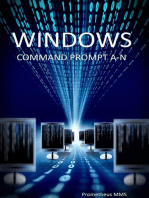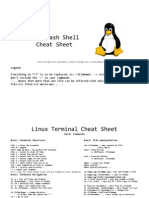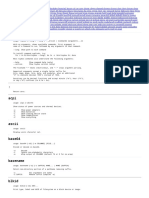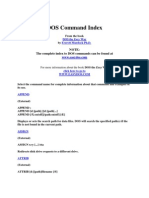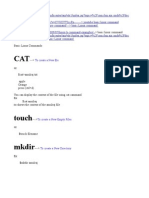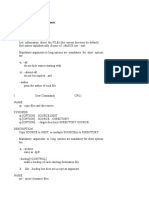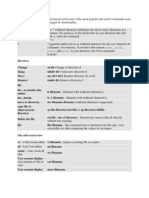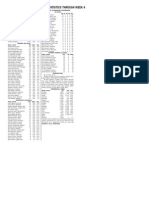0 ratings0% found this document useful (0 votes)
52 viewsUnix Top100 e
The document provides a summary of the 100 most important UNIX/Linux commands. It lists commands for viewing manual pages and documentation, switching users, managing files and directories, viewing and editing files, finding and searching for files, processing output and piping, and more. It also covers important environment variables and basic commands for viewing system information, dates, and help.
Uploaded by
Venkataramana RCopyright
© © All Rights Reserved
Available Formats
Download as PDF, TXT or read online on Scribd
0 ratings0% found this document useful (0 votes)
52 viewsUnix Top100 e
The document provides a summary of the 100 most important UNIX/Linux commands. It lists commands for viewing manual pages and documentation, switching users, managing files and directories, viewing and editing files, finding and searching for files, processing output and piping, and more. It also covers important environment variables and basic commands for viewing system information, dates, and help.
Uploaded by
Venkataramana RCopyright
© © All Rights Reserved
Available Formats
Download as PDF, TXT or read online on Scribd
You are on page 1/ 3
UNIX/LINUX Top100 Commands
Version 1.24 — 17.10.2022
© 2003–2022 T. Birnthaler, OSTC GmbH
17. Oktober 2022
Inhaltsverzeichnis
1 The most important UNIX/LINUX commands 2
2 Other important UNIX/LINUX commands 3
UNIX/LINUX Top100 Commands — 1.24 — 17.10.2022© 2003–2022 T. Birnthaler, OSTC GmbH
1 The most important UNIX/LINUX commands
man CMD Display description for CMD [manual]
man -f/whatis CMD Display 1 line of description for CMD (man-Index) [file]
man -k/apropos TXT Display 1 line of description for topic TXT (man-Index) [keyword]
info CMD Display description for CMD (GNU programs!)
help [CMD] Display description for all/builtin shell CMD
CMD --help/-h/-?/-. Display usage message for CMD (GNU/other programs!)
type [-a] CMD Search for CMD type/place (builtin/alias/function/binary) [all]
who Display all users logged in
whoami who am i Display currently (in terminal) logged in user
id [-a] [USER] Display own/USER name + group memberships + IDs [identity/all]
su [-[l]] USER Switch to account USER (-=-l=incl. environment!) [switch user/login]
su su -[l] Become superuser root (without/with environment change!)
exit logout CTRL-D Log out from terminal/switch back to former account/end of file [EOF]
sudo CMD Execute one(!) command as root [superuser do]
passwd [USER] Change (own/USER) password (1x old, 2x new one) [password]
more/less FILE... Display FILE. . . page by page (also pg, page)
CMD | more/less Display CMD output page by page
lp/lpr FILE... Print out FILE. . . (lpr=BSD, lp=SysV) [line print]
CMD | lp/lpr Print out CMD output
cd [PATH] cd ˜ Switch to directory PATH/own home directory [change directory]
cd / cd .. cd - Switch to root/parent/previous directory (back and forth)
pwd Display current directory [print working directory]
ls [DIR|FILE]... Display content of current dir./DIR/FILE (sorted alphab. ascending!)
ls -l ... Display file names + attributes . . . [long]
ls -a ... Display all file names (hidden ones .XXX too!) [all]
ls -d ... Display only directory name, not directory content [directory]
ls -h ... Display file size in unit K/M/G/T/P/E/T/Z/Y (instead of byte!) [human readable]
ls -i ... Display index-node number [inode]
ls -F ... Append file type char to name (*=exe, /=dir, @=link!) [Flag]
ls -R ... Display whole directory tree [Recursive]
ls -r ... Sort descending (instead of ascending!) [reverse]
ls -S ... Display sorted by file size (ascending!) [Size]
ls -t ... Display sorted by modification time (ascending!) [time]
ls --color=auto File type by color (black=file, blue=dir, turq.=link, green=exec, yellow=device!)
tree [DIR] Display directory tree graphical from current/DIR directory
touch FILE... Update change date of FILE. . . or create new file [touch]
* *.sh ? [abc] File name pattern (all, extension sh, any char, 1 char from abc) [globbing]
mv FILE NAME Rename FILE to NAME [move]
mv FILE... DIR Move FILE. . . to directory DIR [move]
mv FILE DIR/NAME Move FILE to directory DIR and rename it [move]
cp FILE NAME Copy FILE to NAME (overwrite!) [copy]
cp FILE... DIR Copy FILE. . . to directory DIR [copy]
ln FILE NAME Create hard/physical link NAME to FILE [link]
ln -s FILE NAME Create symbolic/logical link NAME to FILE [symbolic]
rm FILE... Delete FILE [remove]
rm -r DIR... Delete complete directory tree starting at DIR. . . [recursive]
mkdir [-p] DIR... Create directory (path) DIR. . . [make directory/path]
rmdir DIR... Delete directory DIR. . . (must be empty!) [remove directory]
cat FILE1 FILE2... Concatenate files and output them to stdout [concatenate]
CTRL-D End of input [EOF/end of file] or logout (instead of exit/logout!)
chmod MODE FILE... Change file perm. [ugoa][+-=][rwxst] (only owner!) [change mode]
umask [NNN] Display/set standard permission mask 000-777 for new files/dirs
(permissions to be removed, r=4, w=2, x=1!) [usage mask]
umask Displays 022 (SuSE, Redhat!) or 002 (Debian, Ubuntu!)
chown USER FILE... Change owner to USER (only root!) [change owner]
chgrp GROUP FILE... Change group owner to GROUP (only owner!) [change group]
UNIX/LINUX Top100 Commands — 1.24 — 17.10.2022© 2003–2022 T. Birnthaler, OSTC GmbH
2 Other important UNIX/LINUX commands
ps pstree top Display own processes/process tree/most active processes [process status]
ps auxw ps -ef Display all processes (BSD/SysV) [all/user/extended/wide/every/full]
kill PID/%JOB... Stop (background) process PID/JOB. . . / (standard signal SIGTERM=15)
kill -9 PID/%JOB Stop (background) process PID/JOB. . . in any case (SIGKILL=9)
kill -l List all signal names + numbers [list]
CTRL-C Cancel CMD entry/currently running CMD (SIGINT=2) [cancel]
CMD & Run CMD in background (as JOB)
nohup CMD & Analogue, don’t stop at logout [no hangup]
CTRL-Z bg Stop running CMD + switch to background [background]
bg/fg %JOB Switch JOB to background/foreground
jobs Display all background processes of shell
CMD < FILE Read input for CMD from FILE
CMD > FILE >> FILE Write/append output of CMD to FILE
CMD 2> FILE 2>> ... Write/append error messages of CMD to FILE
CMD 2> /dev/null Ignore error messages of CMD
CMD > FILE 2>&1 Write output + error messages of CMD to FILE
CMD1 | CMD2 Connect output of CMD1 to input of CMD2 [pipe]
VAR="TXT" Set shell variable VAR to value TXT (no space around =!)
export VAR Convert shell variable VAR to environment variable
echo $VAR ${VAR} Display content of shell/environment variable VAR twice
set env printenv Display all shell/environment variables
HOME PWD Home directory for cd/current directory [print working directory]
HOST HOSTNAME Name of machine
LANG LC_ALL LC_* Language settings (C, en_US.UTF8, de_DE.UTF8) [language/locale]
PAGER VIEWER Name of standard viewer (e.g. more/less; autom. called by man)
PATH Search path for executables (dir list separated by :!)
PS1 PS2 PS3 PS4 Shell prompt: normal/continuation/select/debug [prompt string]
TERM Terminal type (editors, more, curses library) [terminal]
USER LOGNAME Name of logged in user [login name]
EDITOR VISUAL Name of standard editor (e.g. autom. called by crontab/visudo)
PRINTER LPDEST Name of standard printer (e.g. autom. called by lp/lpr)
find [DIR] ... Search/list/process files/dirs by name + attr. starting from curr. dir/DIR
grep "TXT" FILE... Display lines of FILE containing TXT [global regex print]
CMD | grep "TXT" Display lines of CMD output containing TXT
head [-N] FILE... Display first 10/N lines of FILE
CMD | head [-N] Display first 10/N lines of CMD output
tail [-N] FILE... Display last 10/N lines of FILE
CMD | tail [-N] Display last 10/N lines of CMD output
tail -f FILE... Show added lines at end of FILE continuously [follow]
tail +N FILE... Show lines from line N of FILE. . .
wc -l/-w/-c FILE... Display number of lines/words/characters in FILE [word count/line/word/char]
CMD | wc -l/-w/-c Display number of lines/words/characters of CMD output
echo [-n] "TXT" Display TXT on terminal (-n=without linefeed!) [no newline]
clear CTRL-L Erase terminal content (blank screen) [formfeed/leeren]
date [+FORMAT] Display date + time (according to FORMAT, e.g. %T %D %H:%M:%S %d.%m.%Y)
more/less FILE... Page through FILE by following cmds (man autom. uses more/less!):
SPACE RETURN Skip 1 page/line further [space key/return key]
b Skip 1 page back (only less!) [backward]
1G G NG Go to top/bottom/line N of file (nur less!) [Go]
/TXT ?TXT Search TXT forward/backward (only less!)
n N Repeat last search forward/backward (only less!) [next]
:n :p Jump to next/previous (only less!) file [next/previous]
q h Leave more/less [quit]; Display help [help]
CTRL-R TXT... Search cmd history for last one containing TXT [reverse search]
CTRL-R Search next cmd in history containing TXT [reverse search]
Cursor-Up/Down Goto previous/next cmd in history
!NR !TXT !! Execute cmd number NR/beginning with TXT/last from history
You might also like
- Hourglass Workout Program by Luisagiuliet 276% (21)Hourglass Workout Program by Luisagiuliet 251 pages
- The Hold Me Tight Workbook - Dr. Sue Johnson100% (16)The Hold Me Tight Workbook - Dr. Sue Johnson187 pages
- Read People Like A Book by Patrick King-Edited62% (66)Read People Like A Book by Patrick King-Edited12 pages
- Livingood, Blake - Livingood Daily Your 21-Day Guide To Experience Real Health77% (13)Livingood, Blake - Livingood Daily Your 21-Day Guide To Experience Real Health260 pages
- COSMIC CONSCIOUSNESS OF HUMANITY - PROBLEMS OF NEW COSMOGONY (V.P.Kaznacheev,. Л. V. Trofimov.)94% (212)COSMIC CONSCIOUSNESS OF HUMANITY - PROBLEMS OF NEW COSMOGONY (V.P.Kaznacheev,. Л. V. Trofimov.)212 pages
- Donald Trump & Jeffrey Epstein Rape Lawsuit and Affidavits83% (1016)Donald Trump & Jeffrey Epstein Rape Lawsuit and Affidavits13 pages
- The 36 Questions That Lead To Love - The New York Times94% (34)The 36 Questions That Lead To Love - The New York Times3 pages
- The 36 Questions That Lead To Love - The New York Times95% (21)The 36 Questions That Lead To Love - The New York Times3 pages
- Jeffrey Epstein39s Little Black Book Unredacted PDF75% (12)Jeffrey Epstein39s Little Black Book Unredacted PDF95 pages
- The 4 Hour Workweek, Expanded and Updated by Timothy Ferriss - Excerpt23% (954)The 4 Hour Workweek, Expanded and Updated by Timothy Ferriss - Excerpt38 pages
- Herb Dewey - Mindblowing Psychic Readings OCRd82% (11)Herb Dewey - Mindblowing Psychic Readings OCRd72 pages
- Unix/Linux Command Reference: File Commands System InfoNo ratings yetUnix/Linux Command Reference: File Commands System Info5 pages
- Key/ Comm and Description: Wednesday, 9 September 2020No ratings yetKey/ Comm and Description: Wednesday, 9 September 20207 pages
- Environment Control: Command DescriptionNo ratings yetEnvironment Control: Command Description22 pages
- Environment Control: Command DescriptionNo ratings yetEnvironment Control: Command Description2 pages
- <!DOCTYPE HTML PUBLIC "-//W3C//DTD HTML 4.01 Transitional//EN" "http://www.w3.org/TR/html4/loose.dtd"> <HTML><HEAD><META HTTP-EQUIV="Content-Type" CONTENT="text/html; charset=iso-8859-1"> <TITLE>ERROR: The requested URL could not be retrieved</TITLE> <STYLE type="text/css"><!--BODY{background-color:#ffffff;font-family:verdana,sans-serif}PRE{font-family:sans-serif}--></STYLE> </HEAD><BODY> <H1>ERROR</H1> <H2>The requested URL could not be retrieved</H2> <HR noshade size="1px"> <P> While trying to process the request: <PRE> TEXT http://www.scribd.com/titlecleaner?title=Unix+commands+reference+card.pdf HTTP/1.1 Host: www.scribd.com Proxy-Connection: keep-alive Accept: */* Origin: http://www.scribd.com X-CSRF-Token: 155fb7fa517a5becb07621cfee52141124ac069c User-Agent: Mozilla/5.0 (Windows NT 6.1; WOW64) AppleWebKit/537.36 (KHTML, like Gecko) Chrome/27.0.1453.116 Safari/537.36 X-Requested-With: XMLHttpRequest Referer: http://www.scribd.com/upload-document?archive_doc=1249No ratings yet<!DOCTYPE HTML PUBLIC "-//W3C//DTD HTML 4.01 Transitional//EN" "http://www.w3.org/TR/html4/loose.dtd"> <HTML><HEAD><META HTTP-EQUIV="Content-Type" CONTENT="text/html; charset=iso-8859-1"> <TITLE>ERROR: The requested URL could not be retrieved</TITLE> <STYLE type="text/css"><!--BODY{background-color:#ffffff;font-family:verdana,sans-serif}PRE{font-family:sans-serif}--></STYLE> </HEAD><BODY> <H1>ERROR</H1> <H2>The requested URL could not be retrieved</H2> <HR noshade size="1px"> <P> While trying to process the request: <PRE> TEXT http://www.scribd.com/titlecleaner?title=Unix+commands+reference+card.pdf HTTP/1.1 Host: www.scribd.com Proxy-Connection: keep-alive Accept: */* Origin: http://www.scribd.com X-CSRF-Token: 155fb7fa517a5becb07621cfee52141124ac069c User-Agent: Mozilla/5.0 (Windows NT 6.1; WOW64) AppleWebKit/537.36 (KHTML, like Gecko) Chrome/27.0.1453.116 Safari/537.36 X-Requested-With: XMLHttpRequest Referer: http://www.scribd.com/upload-document?archive_doc=12492 pages
- Environment Control Environment Status: Command Description Command DescriptionNo ratings yetEnvironment Control Environment Status: Command Description Command Description1 page
- Practical+Linux+Cmd+Line+2.0+-+Cheat+SheetNo ratings yetPractical+Linux+Cmd+Line+2.0+-+Cheat+Sheet5 pages
- Unix Commands: Unix Commands Command/Syntax What It Will DoNo ratings yetUnix Commands: Unix Commands Command/Syntax What It Will Do3 pages
- Dev To Awwsmm 101 Bash Commands and Tips For Beginners To Experts 30jeNo ratings yetDev To Awwsmm 101 Bash Commands and Tips For Beginners To Experts 30je20 pages
- Idoc - Pub - All Commands in Ms Dos PDFNo ratings yetIdoc - Pub - All Commands in Ms Dos PDF44 pages
- Ms-Dos: Microsoft Disk Operating SystemNo ratings yetMs-Dos: Microsoft Disk Operating System14 pages
- Process Mapping and Value Stream MappingNo ratings yetProcess Mapping and Value Stream Mapping24 pages
- Uk Allows Platform For Khalistan Call To Arms: 12 Spos Have Quit, Announce ImamsNo ratings yetUk Allows Platform For Khalistan Call To Arms: 12 Spos Have Quit, Announce Imams20 pages
- Budapest Ceenet 2001 - Satellite CommunicationsNo ratings yetBudapest Ceenet 2001 - Satellite Communications93 pages
- M.A. Psychology First Year Practical File MPCL-00750% (2)M.A. Psychology First Year Practical File MPCL-00754 pages
- Leading the Way in Financial Excellence: M&M AL MENHALI AUDITING, Dubai's Top Accounting FirmNo ratings yetLeading the Way in Financial Excellence: M&M AL MENHALI AUDITING, Dubai's Top Accounting Firm7 pages
- Communicative Activities For Middle School Classroom PDFNo ratings yetCommunicative Activities For Middle School Classroom PDF3 pages
- Worksheet 26 Pronouns and Their AntecedentsNo ratings yetWorksheet 26 Pronouns and Their Antecedents2 pages
- Danfoss Light Commercial Refrigeration Compressors: Gd30FdcNo ratings yetDanfoss Light Commercial Refrigeration Compressors: Gd30Fdc20 pages

































